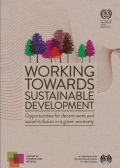This volume examines the experiences of 21 developed and developing countries in adjusting their training provision to meet the new demands of a greener economy. Analysts started by identifying the drivers of transformation to a greener economy – changes in the physical environment itself and changes induced by government regulations, more efficient technologies and changes in consumer demand. Then they assessed the effect of these changes on employment, identifying areas of job growth and of job loss
Only then could researchers start to understand how skill requirements are changing and are expected to change in the future, and to examine how well national training systems are anticipating and responding to these new needs. Their analysis shows that skills development is critical to unlocking the employment potential of green growth, yet skills shortages are becoming an obstacle in realising this potential. The report recommends that countries devise strategies based on well-informed policy decisions, social dialogue, and coordination among ministries and between employers and training providers.
A number of studies for industrialised countries assess how a transition to a sustainable, low-carbon economy might affect employment. These typically find overall job gains compared to “business-as-usual” scenarios. The more detailed of these studies address not just changes in the total number of jobs, but also underlying job movements as well as the quality of jobs. Such knowledge is vital to informing policies that enable a just transition to a green economy, yet there are few comparable studies for developing countries. A key bottleneck is the scarcity of information, particularly employment and production data on green jobs as well as on linkages with the rest of the economy. As part of the ILO’s Global Green Jobs Programme, this guide provides practical solutions tailored to the considerations of developing countries that can help fill these information gaps. The guide adopts a menu approach, providing policy-makers with a range of options that take into account time and resource constraints as well as policy priorities.
The sectors of the built environment are the main sources of emissions of carbon dioxide and other greenhouse gases. They are key contributors to climate change and to the depletion of natural resources. It is essential to make the activities related to the production and use of the built environment an integral part of the solution to these environmental problems. At the same time, efficiency in the built environment encourages the development of new professional skills and can generate employment opportunities.
This Manual provides guidance to ILO units and field offices which wish to engage in studies and projects related to greening sectors of the built environment. First, it provides relevant background data to inform the preparation of studies and projects. Second, it provides a step-by-step guide to the development of such initiatives. The sectors examined include infrastructure & construction, water, energy and sanitation systems, waste management and recycling, urban agriculture. Sector specific analyses are provided, and the connections between sectors (the built environment system) are also explored.
Climate change is now widely acknowledged as one of the great – if not the greatest – challenges facing humanity in the coming decades. Through its impact on average temperature, precipitations and sea levels, it will endanger the livelihood of hundreds of millions and impose increasing costs on our societies if nothing is done.
It is becoming increasingly clear that the only way to get the sort of commitments needed to effectively deal with the challenge is to create a global consensus that involves all stakeholders. Such a consensus will only arise if there is a seemingly “just” sharing of the burden in this battle to keep the planet hospitable to human beings.
This is particularly true when it comes to employment. It goes without saying that climate change and policies to mitigate it will in time have an enormous impact on industries, jobs and workers. Yet, despite the rhetoric about the elusive “social dimension” of sustainable development, until very recently climate change negotiations showed only limited concern about the fate of workers, and far greater efforts were directed at measuring the environmental rather than the social impacts of climate change.

This joint study by the International Labour Organisation (ILO) and the United Nations Environment Programme (UNEP) highlights that the transformation to a greener economy could generate 15 to 60 million additional jobs globally over the next two decades and lift tens of millions of workers out of poverty. The report documents evidence that for countries at all levels of development the drive towards environmental sustainability and greener economies is gaining momentum. The study indicates that job growth has been particularly strong in the renewable energy sector, with a global increase of 21 per cent per annum. As a result, the sector now employs close to 5 million workers; more than double the number employed only a few years ago.
This summary was prepared by Eldis.
